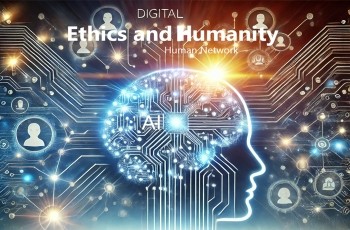シンクタンクからの眼 2023年10月10日
AIデジタル化の未来と個の力量の重要性 The Importance of Individual Competence in the AI Digital Future

AIデジタル化の未来と個の力量の重要性
AIやデジタル技術の急速な進化は、現代の研究分野に大きな変革をもたらしています。オープンイノベーションやデジタル共創の推進により、知識や技術の壁を越えた協力が実現する一方で、研究者個々の能力がこれまで以上に重要視される時代となりました。今回は未来の研究者が直面する課題と、それに求められるスキルや姿勢について考えてみたいと思います。
AIの登場により、研究のスピードと効率は劇的に向上しています。膨大なデータ解析や高速シミュレーション、複雑な論文要約の自動生成、さらにはパターン認識を通じた新発見など、AIやデジタルテクノロジーは従来の研究プロセスを一変させる力を持っています。
しかし、どれほど高度な技術が発展しても、それを効果的に活用し、新たな価値を生み出すのは、我々の「人間」にほかなりません。AIは、本質的には補助的な役割を担うツールであり、人間社会に貢献する研究の方向性を決定し、社会に成果を還元するのは研究者自身の力量に依存しています。
先ずは、批判的思考と創造力が問われると思います。AIがデータを解析し、提案を行う時代においても、提示された情報を批判的に評価し、新しいアイデアを生み出す力は人間にしかありません。人工知能が生む結果をただ受け入れるのではなく、それをどのように解釈し応用するかが重要だと思います。
次に、人的コミュニケーション能力がさらに重要になるに違いありません。研究分野では、デジタルツールを介した協力が増えればふえるほど、研究者同士の対話や信頼関係の構築が重要になります。特に、異なる分野との学際的共創を成功させるためには、研究者同士の多様なアイデアも分かりやすく共有し、共感を生む力が必要です。
そして、学び続ける姿勢がなければいずれ取り残されていくでしょう。今でも未来でもAIやテクノロジーは常に進化しています。その中で、最新のテクノロジーや研究手法を取り入れる柔軟性と学習意欲が欠かせません。学び続ける姿勢とは、ある意味では過去の成功に固執しないことでもあります。すなわち、研究者たる者は、常に新しい知識やスキルを積極的に習得する姿勢が求められます。
特に、倫理観と人間愛を持ち続ける努力が必要になります。AI時代だからこそ、人間らしい価値観を持ち続ける研究者が求められています。研究成果が人間社会に与える影響を考慮し、公平性や倫理観を持ちながら、持続可能な発展を目指す姿勢が大切です。
AIデジタル化が進む未来においても、人間が主導する研究の在り方は変わりないと思います。AIやデジタルテクノロジーは、あくまで人間の創造性や努力を引き出すためのツールであるからです。テクノロジーに過剰に依存するのではなく、自らの価値を追求し続けることで、個の力量が一層輝くことでしょう。
テクノロジーと人間性のバランスを保ちながら、研究者は日々の研鑽と他者との協力を重ねることで、研究成果を上げ続ける存在となるでしょう。そうした研究者が増えることで、オープンイノベーションの成果もさらに拡大し、人類全体に貢献する新たな価値を生み出すことが期待されます。AIやデジタルテクノロジーを味方に付け、人間らしさを忘れず、新たな挑戦を続けていく未来型研究者が増えていくことに大いに期待したいと思います。
(玉川きょうさい、Ph.D./Prof.)
The Digital Future of AI and the Importance of Individual Capabilities
Modern research fields are undergoing major changes due to the evolution of AI and other digital technologies. While the promotion of open innovation and co-creation enables cooperation that transcends knowledge and technology barriers, we have entered an era in which the capabilities of individual researchers are being questioned more than ever before. In this environment, I would like to consider the challenges that future researchers will face and the skills and attitudes they will need.
The rise of AI has dramatically improved the speed and efficiency of research activities. For example, it is now possible to support research in ways that were previously unimaginable, such as accelerating large-scale data analysis and simulations, generating summaries of papers, and making new discoveries through pattern recognition.
However, no matter how much these technologies develop, it is ultimately "humans" who effectively utilize them and create new value. While AI plays a supporting role, it is none other than the capabilities of individuals that determine the direction of research and return the results to society.
Even in an age in which AI analyzes data and makes proposals, only humans have the ability to critically evaluate the information presented and generate new ideas. Rather than simply accepting the results produced by machines, it is important to know how to interpret and apply them.
In the field of research, while collaboration through digital tools is on the rise, dialogue between people and building trust remain important. In particular, to succeed in co-creation with different fields, it is necessary to have the ability to explain complex ideas in an easy-to-understand manner and generate empathy.
AI and technology are constantly evolving. In this environment, flexibility and a desire to learn are essential to adopt the latest technologies and research methods. Rather than clinging to past successes, researchers are required to be proactive in acquiring new knowledge and skills.
In the age of AI, researchers with human-like values are in demand. It is important to consider the impact of research results on society, have fairness and ethics, and aim for sustainable development.
Even in a future where digitalization is progressing, the nature of human-led research will not change. AI and digital technology are merely tools to bring out human creativity and effort. By continuing to pursue one's own value rather than relying excessively on technology, the abilities of individual researchers will shine even more.
Daily study and a spirit of cooperation are essential to leading future research fields while maintaining a balance between technology and humanity. As the number of individuals with these skills increases, the results of open innovation will likely expand even further.
As a researcher of the future, I want to continue taking on new challenges with AI and digital technology on my side, without forgetting my humanity.
(K.S. Tamagawa, Ph.D./Prof.)




